Public Holidays in Dubai 2023: A Comprehensive Overview
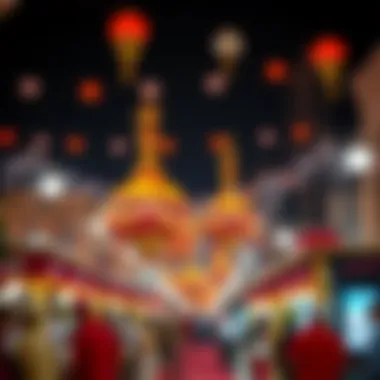

Intro
Public holidays in Dubai serve not only as times for celebration and relaxation but also play a significant role in shaping the local economy, especially the real estate market. The unique blend of tradition and modernity in the UAE offers a fascinating backdrop to these often-visible holidays. With expatriates making up a significant portion of the population, the cultural context surrounding these days adds layers to the understanding of social dynamics within the city. Through this article, we shall explore the various public holidays observed in Dubai through 2023 and how they impact life, culture, and investment opportunities in this vibrant emirate.
Market Insights
Current Trends
Looking at the current trends in real estate during public holidays, one cannot ignore how these days influence buying behaviors. Holidays typically see a surge in viewings, with families wanting to move before summer kicks in or during the festive seasons. For instance, around Eid Al-Fitr in April, many people ramp up their property search, inspired by the holiday spirit and often taking advantage of the lower heat. The community-driven events and festivities draw residents out, offering potential buyers a tangible feel of neighborhoods.
Price Analysis
Again, it’s interesting to note how the real estate price fluctuate during the holidays. In anticipation of high demand during festive periods, listings sometimes see price tags that can rise subtly. In addition, with fewer transactions happening during Ramadan, sellers might hold off listings, creating a bottleneck that skews market prices. Data from property platforms like Bayut and Dubizzle can provide insights. The average rental and sale prices typically exhibit erratic trends over these periods, with a noticeable rise during key holidays as people try to settle in before the end of the year.
"Understanding the cycle of market trends during public holidays can help buyers and investors make informed decisions."
Investment Strategies
Buying vs. Renting
When looking at the option between buying and renting around public holidays, it often boils down to individual circumstances. Those with a long-term vision usually lean towards purchasing property, especially with compelling offers during festive seasons. Meanwhile, renters may find that holiday promotions reduce rental costs slightly, making it an appealing short-term solution. Factors such as the length of stay, family needs, and personal finances heavily influence these choices.
Financing Options
Financing plays a crucial role in property transactions during public holidays. Lenders frequently roll out exclusive promotions, reducing costs with lower interest rates or processing fees. There are various financing institutions like Emirates NBD and Abu Dhabi Commercial Bank that tend to have special offers aligning with public holidays. This can lead to appealing terms for expatriates looking to invest in this booming property market.
As we navigate through these holidays in 2023, understanding their implications on the real estate landscape becomes crucial—allowing buyers, investors, and industry professionals to make more strategic decisions in a rapidly changing environment.
Intro to Public Holidays in Dubai
Public holidays in Dubai serve as essential markers not only of the calendar year but also of the city's rich tapestry woven from diverse cultural, religious, and historical influences. Understanding these holidays offers valuable insights into the values and traditions that shape daily life in this vibrant urban landscape. People from various nationalities live and work here, thus giving an added layer of complexity to how these holidays are observed.
The significance of public holidays goes far beyond mere days off from work; they provide opportunities for families to come together, for communities to celebrate solidarity, and for expatriates to immerse themselves in local customs. Underlying these celebrations is a complex interplay of faith and culture that makes Dubai unique. Many of these holidays are anchored in Islamic traditions and relate directly to significant events in the religion's history, while also opening doors to broader cultural festivities that appeal to the diverse populace.
Beyond celebrations, public holidays in Dubai affect various sectors. For investors and real estate professionals, being aware of these holidays can highlight potential shifts in market activity. This aspect is particularly striking during festive periods when families may change their living situations, making the holiday calendar a practical aspect of strategic planning in the real estate market.
This section sets the stage for a deeper exploration of each public holiday, allowing readers to appreciate their cultural contexts and significance. Furthermore, understanding the implications of these observances is crucial for anyone looking to engage meaningfully with Dubai’s dynamic landscape.
Understanding the Significance
Public holidays are more than just dates marked on a calendar; they resonate deeply within the community. These are moments when people come together, encouraged to pause their daily hustle and celebrate shared beliefs and values. In Dubai, significant days like Eid al-Fitr and Eid al-Adha pull people from various backgrounds into a shared experience of celebration. Such gatherings enhance social ties and foster a sense of belonging, which is particularly vital in a metropolis where a large portion of the population comes from abroad.
The commercial implications of these holidays can not be ignored. Retail businesses see spikes in sales due to gift-giving traditions and festive promotions. Meanwhile, the hospitality sector gears up to accommodate families and tourists keen to celebrate within the city’s lavish resort culture. The rhythm of trade and commerce changes, presenting unique opportunities—whether for seasoned investors or newcomers looking at property investment.
Cultural and Religious Context
The cultural and religious calendar in Dubai is markedly shaped by Islamic traditions, which dictate significant holidays based on lunar cycles. For instance, Eid al-Fitr, which marks the end of Ramadan, is a time of joy and reflection. Families gather for elaborate meals and give alms to those in need, emphasizing the values of charity and community. Similarly, Eid al-Adha reflects themes of sacrifice and devotion, allowing individuals and families to reflect on their blessings and commitments.
Understanding this context is essential for anyone navigating the local landscape. The holidays reflect not only spiritual observances but also social norms and expectations that impact daily life—from how businesses operate to how families plan their engagements.
List of Public Holidays in Dubai
In any society, public holidays serve as a window into its cultural fabric and community values. For Dubai, a city that exemplifies a blend of modernity and tradition, these holidays reflect not just religious observances but also community spirit and social engagement. The importance of this section is to outline and explore the public holidays for 2023, which will provide investors, buyers, agents, developers, and expatriates with key insights into the patterns of daily life, economic rhythms, and possible opportunities tied to these significant dates.
Identifying Key Holidays
Dubai celebrates a diverse range of public holidays throughout the year, mainly rooted in Islamic traditions. Here are some of the key holidays to note for 2023:
- Eid al-Fitr: Marking the end of Ramadan, this holiday is a joyous occasion that brings families together.
- Eid al-Adha: A pivotal festival rooted in sacrifice and charity, celebrated with communal prayers and gatherings.
- Commemoration of the Prophet Muhammad’s Birthday: A day dedicated to remembering the teachings of the Prophet and participating in various festivities.
- UAE National Day: Celebrated on December 2nd, showcasing national pride and unity.
- Islamic New Year: A reflective moment in the Islamic calendar, recognized but typically not widely celebrated.
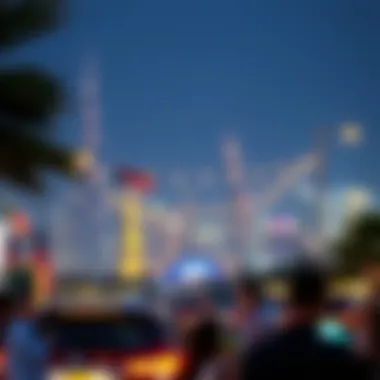

Each of these holidays resonates deeply within the community, impacting social interactions and even business operations. For investors, understanding these dates can provide a competitive edge, as they may affect market dynamics, fervor for property acquisitions, and consumer behavior.
Date-specific Celebrations
Celebrations in Dubai are as vibrant as they are varied, often characterized by large gatherings, festivals, and cultural activities. Understanding the timing of these events is essential for alignment with market movements and opportunities. Here’s a breakdown:
- Eid al-Fitr (April 21 - April 23): This festive period kicks off the first day after Ramadan. Families typically indulge in lavish meals and share gifts, which boosts retail and hospitality sectors significantly.
- Eid al-Adha (June 29 - July 2): Also known as the Festival of Sacrifice, it encourages acts of charity and community sharing, translating into increased shopping and hospitality activities.
- Commemoration of the Prophet Muhammad’s Birthday (September 27): This is marked with various religious and cultural activities that foster community ties, though it's a public holiday, the business operations largely remain unaffected.
- UAE National Day (December 2): This day is celebrated with parades, fireworks, and a general sense of camaraderie. Investors may notice a spike in property-related events aimed at showcasing national achievements.
- Islamic New Year (July 18): While it signifies the beginning of a new year in the Islamic calendar, celebrations are generally low-key, often resulting in a quiet day for business.
Being aware of these date-specific celebrations is crucial for navigating potential real estate transactions or investment opportunities. As public sentiment flourishes or wanes in accordance with holiday observances, so too might the market activity in property and other sectors flouriish. Knowing when these holidays fall allows investors and developers to plan strategically.
Eid al-Fitr: Celebrating the End of Ramadan
Eid al-Fitr stands as a significant celebration for Muslims worldwide, marking the conclusion of Ramadan, a month dedicated to fasting, prayer, and reflection. In Dubai, as in other regions of the UAE, this festival encapsulates both cultural heritage and shared community values. The festivities often bring together families, friends, and communities in a display of unity and joy, which in turn creates a vibrant atmosphere in the city.
Historical Background
Eid al-Fitr, which translates to the "Festival of Breaking the Fast," has roots that extend back to the time of the Prophet Muhammad. It is believed that this festivity was instituted by the Prophet himself after the Battle of Badr, symbolizing a moment of gratitude towards Allah for His guidance and providence. Over centuries, the observance of Eid evolved, enhancing in cultural and communal significance. The first Eid was celebrated during the year 624 CE. Today, it’s a public holiday in Dubai, embraced with enthusiasm and reverence.
Traditions and Customs
The day begins with a special prayer known as "Salat al-Eid," held in mosques and open areas. Following the prayer, it's customary for families to share meals and sweets, often highlighting dishes such as qubuli and maamoul. Giving to charity, known as Zakat al-Fitr, is also essential, as it emphasizes the importance of giving to the less fortunate. Additionally, visiting family members, wearing new clothes, and exchanging gifts are prevalent practices. These traditions foster a sense of belonging and communal celebration.
Impact on Real Estate Transactions
Eid al-Fitr influences various sectors, including real estate in Dubai. The period following the holiday often sees an uptick in property transactions, driven by expatriates returning from their travels and new projects being launched. Investors and buyers who understand the rhythm of these holiday markets can capitalize on opportunities. Real estate agents often observe increasing interest as families return, with many looking to relocate or invest in new properties. Notably, the festive spirit encourages potential buyers to engage more openly, thus leading to numerous deals being closed shortly after the celebrations.
"Eid al-Fitr is not just a festival; it's a time to reflect and connect, ultimately nurturing the spirit of community and shared aspirations."
In summary, Eid al-Fitr enriches the cultural tapestry of Dubai, creating an atmosphere ripe for communal bonding and economic activity. Understanding the implications of this holiday is essential for investors and buyers who want to navigate the real estate market strategically in Dubai during this illustrious period.
Eid al-Adha: A Commemoration of Sacrifice
Eid al-Adha is a significant event in the Islamic calendar, embodying themes of sacrifice, community, and gratitude. This holiday, also known as the Festival of Sacrifice, is celebrated by Muslims around the world, including the vibrant city of Dubai. Understanding Eid al-Adha offers valuable insights into local traditions and cultural sentiments, making it essential for anyone looking to engage with Dubai's real estate market during this festive period.
Understanding the Celebration
Eid al-Adha commemorates the willingness of Ibrahim (Abraham) to sacrifice his son in obedience to God's command. This narrative is central to Islamic faith and is remembered with great reverence. Celebrated on the 10th day of Dhu al-Hijjah, the holiday aligns with the conclusion of the Hajj pilgrimage, which further emphasizes its religious significance. Families come together to offer prayers at mosques and engage in communal feasts as a means to foster connections and share blessings. It's during this time that many people take part in the ritual of performing Qurbani, the act of slaughtering livestock as a symbolic gesture of sacrifice.
Cultural Events and Activities
During Eid al-Adha, Dubai springs to life with numerous events and activities that cater to the community’s diverse background. These activities often reflect the rich tapestry of Emirati culture and Islamic customs:
- Festive Markets and Fairs: Local markets, such as the Global Village and Souk Al Bahar, host seasonal events showcasing cultural performances, artisan crafts, and traditional Emirati cuisine.
- Culinary Experiences: Restaurants feature special menus that include traditional delicacies, allowing families to gather both at home and in communal dining spaces.
- Charitable Initiatives: Charity plays a vital role during this time. Many families give to those in need, reinforcing the sense of community and shared responsibility.
Such events help to create a unique atmosphere that resonates with the spirit of Eid, making it not just a religious observance but an integral part of community life.
Market Activity During Eid al-Adha
For investors and buyers in the real estate market, Eid al-Adha presents a distinct set of dynamics that can affect various sectors:
- Increased Rental Demand: Many expatriates opt to travel during this holiday, leading to a temporary spike in vacation rentals. Investors should be aware of the potential for short-term rental income during this festive time.
- Shopping and Entertainment Spending: There is a surge in retail activities leading up to and during Eid. Data from previous years indicates that consumer spending can jump significantly, affecting local economies and businesses.
- Real Estate Transactions: Although the holiday traditionally sees a slowdown in formal transactions due to individuals being engaged with family activities, post-Eid signifies a rise in inquiries and sales as people return motivated to make moves.
The strategic timing of property investments around this holiday can yield fruitful opportunities if one is aware of market trends and consumer behavior leading up to and following Eid.
In summary, Eid al-Adha in Dubai is more than a religious event; it is a powerful reminder of cultural heritage and community bonding. For the discerning investor or buyer, understanding the intersection of this celebration with market activity can offer lucrative opportunities, ensuring one is well-prepared to navigate the evolving landscape of Dubai's real estate market.
Commemoration of the Prophet Muhammad’s Birthday
The Commemoration of the Prophet Muhammad’s Birthday holds a distinguished place within Dubai's cultural landscape. This observance is more than just a religious holiday; it reflects a profound connection to the teachings and life of Islam's final Prophet. For residents, expatriates, and investors in Dubai, understanding this holiday's significance is essential due to its cultural and economic implications.
As a moment in time that honors compassion, forgiveness, and unity, this holiday serves as a platform for people to come together in reverence and reflection. For the expatriate community, it opens avenues to engage with local traditions and values, fostering a deeper appreciation for the UAE's rich heritage.
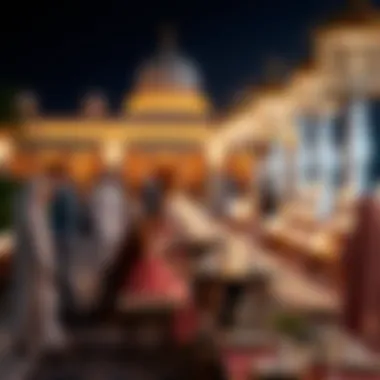

Traditions Surrounding the Holiday
The traditions of celebrating the Prophet Muhammad’s Birthday, known as Mawlid al-Nabi, vary across cultures, but they share common threads. In Dubai, the celebrations often involve:
- Public processions and prayers: Streets may become alive with parades showcasing religious fervor. Local mosques hold special prayer sessions, where communities gather to listen to the recitation of the Quran and reflections on the Prophet’s life.
- Distributing food and charitable acts: Gifting food to the needy is common. Many individuals and organizations organize meals for those less fortunate, embodying the Prophet's teachings on care and compassion.
- Cultural events: Artistic performances, poetry recitations, and lectures are organized to honor the Prophet’s message. These events serve to educate attendees about the values he preached.
This myriad of traditions brings vibrancy to the holiday, allowing people to immerse themselves in the shared ethos of love and respect.
Significance for Residents
For residents of Dubai, this holiday represents a unique moment of togetherness and reflection. It serves as a reminder of the principles of unity, peace, and empathy that form the bedrock of Islamic belief. Many families come together, hosting gatherings that emphasize the importance of community.
From a social standpoint, it reinforces bonds between diverse groups within Dubai's cosmopolitan fabric. Ex-pats often participate in local observances, facilitating cross-cultural exchanges that enrich the community as a whole.
Additionally, this holiday can have underlying impacts on the local economy, particularly in retail and hospitality sectors. Many businesses offer promotions and events related to Mawlid al-Nabi, creating opportunities for residents and investors alike. Understanding these dynamics can guide property transactions and investment strategies around this period.
"Celebrating the Prophet’s Birthday is not just an observance; it's a call to embody the values he stood for."
For more insights, you can consult these resources:
Wikipedia on Mawlid
Britannica on Islamic Holidays
Local Community Events
UAE National Day: Observing Unity and Identity
The UAE National Day, celebrated on December 2nd, stands as a hallmark moment for the Emirates, encapsulating the essence of unity and identity for its residents. In the context of this article, understanding this holiday is crucial for grasping not only the cultural fabric of the UAE but also the numerous ways it influences various sectors, particularly in real estate. This celebration, marking the day in 1971 when the Emirates unified into a single nation, offers valuable reflections on development and community spirit that can resonate in today’s market trends.
Historical Significance
The roots of the UAE National Day lie deeply embedded in the history of the Emirates. The federation, formed by seven emirates—Abu Dhabi, Dubai, Sharjah, Ajman, Umm Al-Quwain, Fujairah, and Ras Al Khaimah—marks the establishment of a diverse yet cohesive nation. Understanding the historical significance is pivotal for investors and expatriates, as it sets the stage for the Emirati identity and culture that continues to evolve.
This day is not only a celebration of independence but also a tribute to the vision of leaders who steered the Emirates towards progress. The narrative of growth, resilience, and aspiration provides a backdrop for current societal values and economic stability, which directly impacts the real estate landscape.
National Celebrations and Events
UAE National Day is marked by vibrant celebrations across all emirates, with Dubai often taking center stage. The festivities begin early in the day, with a range of events, including:
- Parades: Colorful displays of traditional music, dance, and costumes are a common sight, bringing together people from all walks of life. These parades reflect the strength of national pride and unity.
- Fireworks: As night falls, the sky lights up with spectacular firework displays, particularly around iconic landmarks like the Burj Khalifa and Dubai Marina.
- Cultural Activities: Many organizations organize events that showcase Emirati heritage through art exhibitions, food festivals, and educational talks, allowing residents and visitors alike to engage with the rich cultural history.
On UAE National Day, the spirit of unity shines through, inspiring both national pride and community engagement.
For investors, it’s also an ideal time to perceive the market’s pulse, as interaction among residents during the festivities often leads to conversations about potential property investments or developments, offers a unique insight into residential sentiments.
Sectoral Impacts on Real Estate
The celebrations of UAE National Day generate a notable ripple effect on the real estate sector. They foster not just a festive atmosphere but also fuel market activity and engagement, which can lead to:
- Increased Demand for Properties: Many residents consider purchasing property around this time, fueling demand as the celebratory spirit often translates into heightened interest in the market.
- Promotional Offers: Real estate agents and developers may run special campaigns or offers tailored to coincide with the holiday, providing real opportunities for buyers.
- Community Development: As the day is about unity, developers may look to market community-centric projects that resonate with the values celebrated, appealing to consumers who prioritize sustainability and inclusiveness.
Islamic New Year: A Moment of Reflection
The Islamic New Year, known as Hijri New Year, marks the beginning of the lunar calendar year in Islam. It's a time that resonates with both nostalgia and hopes for the future. Each year, Muslims around the world reflect on the preceding year’s events and contemplate changes they might want to embrace in the coming year. In Dubai, this moment of reflection encapsulates not just the spiritual aspect but also cultural observances that bind the community together.
Cultural Observances
In the United Arab Emirates, the Islamic New Year is not just a date on a calendar; it's a comprehensive experience filled with varying customs and practices. This day often serves as a reminder of the importance of moving forward while respecting the past. Here are some notable cultural elements surrounding the observance:
- Spiritual Reflection: Many individuals engage in prayers and seek forgiveness during this time. This aspect emphasizes inner peace and spiritual growth, allowing people to reevaluate their lives and set their intentions for the year ahead.
- Culinary Traditions: Families often come together to prepare special dishes, embedding hospitality into the essence of the celebration. Traditional foods like lentil soup or dates play a role in the observance, symbolizing blessings for the year to come.
- Community Gatherings: In various neighborhoods in Dubai, small gatherings foster a sense of togetherness. These often include storytelling sessions, where elders share wisdom and tales from previous years, instilling a cultural legacy in the younger generations.
"The coming together of families and the bonds formed on this day remind us of the value of community in our lives."
- Messages of Peace: Many people take this opportunity to send greetings and messages of goodwill to friends and relatives. Emphasizing peace and harmony, these messages reflect the core values of the Islamic faith.
- Decorative Elements: While larger events may not be as prominently displayed compared to other holidays, people still adorn their homes with modest decorations, representing the start of a new chapter in their lives.
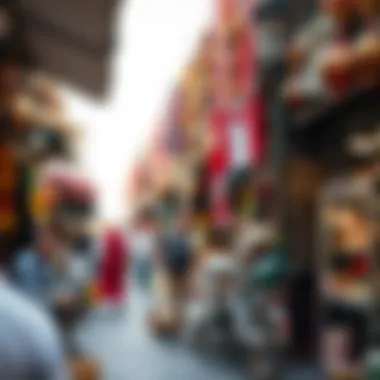
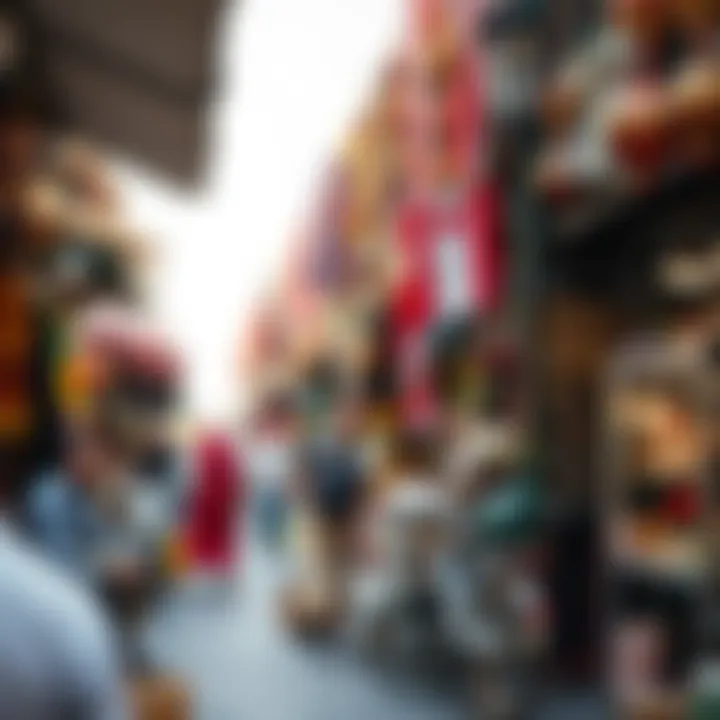
Significance for Investors and Buyers
For investors and buyers observing the dynamics of the real estate market, the Islamic New Year provides a unique window of opportunity.
- Market Analysis: Understanding consumer sentiment during this period can shed light on the market's direction. People are likely assessing their long-term plans, which can manifest in interest in property purchases.
- Cultural Sensitivity: Being aware of this occasion allows real estate professionals to tailor their marketing strategies, aligning them with the cultural values of clients. Customary appreciation of the Islamic New Year can foster stronger relationships.
- Timing Transactions: The new year can often lead to a slowdown in transactions as individuals prioritize personal reflection over buying or selling properties. Being aware of these patterns allows agents and developers to strategize effectively.
Navigating the implications of the Islamic New Year within the context of Dubai's vibrant real estate market offers substantial insights. By factoring in cultural reflections and market behaviors during this time, investors and buyers may find clearer pathways to success.
Valuable Insights for Investors and Buyers
Investing in real estate often raises a myriad of questions, and understanding market conditions during public holidays in Dubai offers crucial insights. These holidays aren't just about days off; they reflect cultural values and influence economic activities. For investors and potential buyers, grasping the rhythms of these celebrations can provide a competitive edge.
Market Dynamics During Holidays
Public holidays in Dubai tend to shift market dynamics significantly. Many residents take time off work, which leads to increased leisure activities and a surge in local tourism. This naturally brings along a few notable trends:
- Increased Foot Traffic: At times like Eid, you’ll notice bustling crowds in malls and parks as families engage in celebrations. This can elevate interest in residential properties nearby.
- Heightened Demand for Short-Term Rentals: Investors with properties suited for short-term stays may find this period particularly lucrative. Tourists and families seeking a getaway often prefer renting over booking hotels during holidays.
- Seller Motivation: Property owners eager to capitalize on festive consumer spending can feel more inclined to negotiate favorable terms, making it a strategic time to purchase.
"Public holidays offer a unique window into the local market's pulse. Ignoring these dynamics may leave investors with a missed opportunity."
Timing Property Transactions
Timing is everything in real estate, and public holidays serve as pivotal moments. Understanding the calendar can guide decisions on when to buy or sell properties. Here are some considerations when planning transactions around holidays:
- Avoid Busy Days: Transacting during the holiday itself may pose challenges due to office closures and limited availability of real estate agents. Aim for earlier days so preparations can be made.
- Leverage Pre-Holiday Buying: Just before major holidays, many sellers may choose to list properties at competitive prices, as they aim to close deals before festivities. This can create a window of opportunity.
- Coordinate With Local Market Trends: Certain celebrations may trigger local events or promotions within neighborhoods. Aligning purchases with these happenings can generate buzz around a property and even enhance its value.
By integrating these insights into their strategies, investors and buyers can navigate the nuances of Dubai's real estate market more effectively. Close attention to public holidays will reveal opportunities that might otherwise go unnoticed.
Community Engagement and Events
In the bustling metropolis of Dubai, public holidays serve not just as days off work but as unique opportunities for community engagement and connection. These holidays foster a sense of belonging among residents, bridging the diverse cultural fabric that characterizes the UAE. During these times, individuals enjoy stepping out of their regular routines to participate in various festive events and local traditions, which can create lasting memories and strengthen community ties.
Local holidays bring together a tapestry of traditions, where both locals and expatriates come together to celebrate. This collective engagement underlines the city's ethos of unity in diversity. It's during these public holidays that the city showcases its rich cultural heritage—through arts, food, and various forms of entertainment—that anyone can relate to and enjoy.
When discussing community engagement during public holidays, it’s essential to recognize the benefits these events bring to residents and newcomers alike. They provide a platform for:
- Networking Opportunities: Engaging with neighbors and community members can lead to invaluable connections, especially for expatriates looking to establish roots in the city.
- Cultural Exchange: Public holidays often highlight local customs and traditions, enhancing awareness and appreciation of different cultures.
- Family Bonding: For many, these holidays are a chance to spend precious time with family, fostering stronger bonds and creating cherished memories.
Furthermore, engaging in local events during holidays can offer practical benefits for those in the real estate sector. Developers and property agents can take advantage by hosting open houses during these times when potential buyers are more likely to be available and in a celebratory mood. Markets and fairs also boisterously buzz with activity, showcasing local businesses and providing entrepreneurs with the chance to shine.
In sum, public holidays in Dubai not only celebrate freedom and unity but also emphasize the importance of community interaction. The vibrancy brought forth during these days is palpable, radiating through the streets filled with laughter, food stalls, performances, and festive decorations.
Local Festivals and Activities
Local festivals and activities during public holidays encapsulate the spirit of Dubai, blending tradition with modernity. The streets come alive with a variety of events that appeal to all ages, making it a prime time for residents and visitors to partake in the joy of celebration. Some key activities that stand out include:
- Cultural Parades: Colorful parades featuring traditional attire and performances take center stage, showcasing the UAE's rich heritage.
- Art Exhibits and Performances: Art installations and live performances often grace public spaces, providing a platform for local artists and entertainers.
- Food Festivals: No holiday celebration is complete without indulging in local delicacies. Food festivals during public holidays allow visitors to experience the culinary creativity that Dubai has to offer.
- Community Service Activities: Many choose to give back during holidays, organizing events that benefit local charities.
Engagement in these festive activities does more than entertain; it teaches and reinforces the values of community support, kindness, and celebration of cultural diversity. Participating in these local happenings fosters growth—not only personally for participants but within the entire community.
As Dubai continues to grow and evolve, the landmarks and activities during public holidays will likewise adapt, yet the essence of belonging, joy, and cultural pride will remain a constant thread in its vibrant tapestry.
Culmination
As we reach the concluding section of our exploration into public holidays in Dubai in 2023, it's vital to emphasize the importance of understanding these occasions not just as days off, but as integral to the cultural fabric and economic landscape of the Emirate. Through the various holidays celebrated, the significance extends beyond mere festivity; it fosters community, strengthens identity, and drives economic activity, especially in sectors like real estate.
Key considerations for stakeholders in Dubai’s property market during these holidays include:
- Increased Market Activity: Holidays often catalyze buyer interest and can lead to spikes in inquiries about properties, both for residential and investment purposes.
- Cultural Events: Local festivities provide avenues for engagement that can enhance the desirability of neighborhoods, potentially impacting property values positively.
- Investor Opportunities: For prospective buyers and investors, aligning property transactions with holiday periods can be advantageous, as market dynamics fluctuate around these dates.
Understanding how these public holidays influence housing demand and market behavior lays the groundwork for making informed decisions.
Summarizing Key Takeaways
- Cultural Relevance: Each holiday serves a purpose, bridging tradition and modernity, empowering the local populace while inviting expatriates to participate.
- Investor Insights: Thorough awareness of holiday celebrations aids buyers and investors in predicting market trends, optimizing timing for purchases or sales.
- Community Engagement: Events tied to these holidays foster relationships among residents, promoting a sense of belonging which is invaluable to anyone looking to settle in or invest in Dubai.
In essence, this article serves as more than just a guide to public holidays; it opens a lens through which Dubai's vibrant social and economic tapestry can be appreciated, making it an essential read for anyone involved in the real estate market here.







